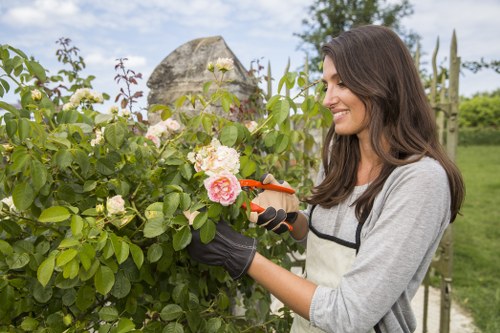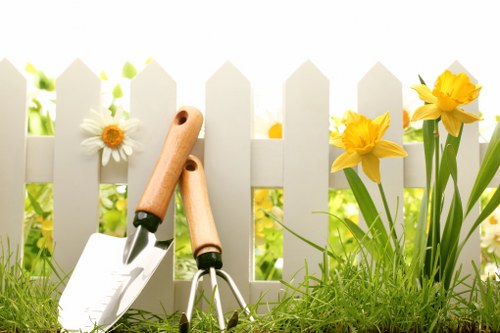Comprehensive Guide to Garden Maintenance in Covent Garden

Introduction
Maintaining a beautiful garden in the heart of Covent Garden requires a blend of expertise, dedication, and knowledge of local conditions. Whether you own a spacious terrace or a cozy plot, regular garden maintenance ensures that your outdoor space remains vibrant and inviting throughout the year.
Covent Garden is renowned for its rich history, picturesque streets, and bustling markets. Amidst this urban landscape, a well-maintained garden serves as a peaceful retreat, enhancing not only your property's aesthetic but also its value.
In this guide, we'll explore essential garden maintenance practices tailored to Covent Garden's unique environment. From seasonal care tips to selecting the right maintenance service, you'll find everything you need to keep your garden flourishing.

Seasonal Garden Care
Spring Maintenance
Spring is a pivotal season for garden maintenance as it marks the transition from winter dormancy to active growth. Begin by clearing debris such as fallen leaves and dead branches to make way for new growth. Pruning shrubs and trees encourages healthy development and prevents overcrowding.
Planting early-blooming flowers like daffodils and tulips can add vibrant colors to your garden. Additionally, it's crucial to assess soil health by conducting a soil test and amending it with appropriate fertilizers to support robust plant growth.
Regular watering is essential, especially as temperatures start to rise. Installing a drip irrigation system can help maintain consistent moisture levels without overwatering.

Summer Maintenance
Summer in Covent Garden brings intense heat and occasionally irregular rainfall. To combat these challenges, focus on water management by mulching around plants to retain soil moisture and regulate temperature. Pruning may be necessary to remove any diseased or dead foliage, ensuring plants remain healthy and less susceptible to pests.
It's also the perfect time to plant annuals that thrive in warmer weather, providing continuous blooms throughout the season. Regular monitoring for pests and diseases is crucial; early detection can prevent minor issues from becoming major problems.
Consider implementing shade solutions like pergolas or shade cloths to protect sensitive plants from excessive sunlight, ensuring they thrive even in peak summer conditions.

Autumn Maintenance
Autumn is a time for preparation, ensuring your garden is ready for the colder months ahead. Start by removing spent plants and clearing out any debris that could harbor pests or diseases over the winter.
Planting hardy perennials and shrubs now will give them a strong foundation to establish roots before the frost sets in. It's also an ideal time to plant trees, as the cooler weather reduces transplant shock and promotes healthy growth.
Adjust your watering schedule as rainfall increases, preventing waterlogged soil and root rot. Additionally, applying a fresh layer of mulch can protect plant roots from freezing temperatures and improve soil structure.

Winter Maintenance
During winter, minimal garden maintenance is required, allowing plants to rest. However, some tasks are essential to prepare for the upcoming year. Protect sensitive plants with burlap or frost covers to shield them from harsh weather conditions.
Prune evergreen trees and shrubs to maintain their shape and remove any damaged branches. This not only enhances their appearance but also promotes healthy growth when spring arrives.
Regularly clear snow from walkways and plant beds to prevent ice damage and ensure safe access to your garden. Assess your tools and equipment, performing necessary maintenance to keep them in optimal condition for the next gardening season.

Essential Services for Covent Garden Gardens
Lawn Care
A well-maintained lawn is the foundation of any beautiful garden. Regular mowing, fertilizing, and aerating are critical practices to keep grass healthy and lush. In Covent Garden, where space may be limited, efficient lawn care ensures your green spaces remain pristine and inviting.
Implementing a proper mowing schedule, typically once a week during peak growth periods, helps maintain an even turf. Using high-quality fertilizers tailored to your grass type promotes vigorous growth and resilience against pests and diseases.
Aeration, the process of perforating the soil to allow air, water, and nutrients to penetrate the grass roots, prevents soil compaction and encourages healthy root development.

Pruning and Trimming
Pruning is essential for maintaining the shape and health of trees and shrubs. It involves removing dead or diseased branches, promoting better air circulation, and encouraging new growth. Regular trimming prevents overgrowth, ensuring plants remain manageable and aesthetically pleasing.
In Covent Garden, where gardens often feature a mix of traditional and contemporary styles, precise pruning techniques help achieve the desired look while supporting plant health.
Using the right tools, such as sharp pruning shears and loppers, ensures clean cuts that reduce the risk of infection and damage to plants.

Pest and Disease Management
Effective pest management is crucial for maintaining a healthy garden. Integrated Pest Management (IPM) strategies, which combine biological, cultural, and chemical controls, offer a balanced approach to controlling pests while minimizing environmental impact.
Regular monitoring helps identify pest and disease issues early, allowing for timely intervention. Employing natural predators, such as ladybugs and lacewings, can reduce pest populations without the need for harsh chemicals.
When necessary, use environmentally friendly pesticides that target specific pests without harming beneficial insects or contaminating the soil.

Soil Health and Fertilization
Healthy soil is the cornerstone of a thriving garden. Conducting soil tests helps determine nutrient deficiencies and pH levels, guiding appropriate fertilization practices. In Covent Garden, where urban soil may be compacted or nutrient-poor, enhancing soil health is particularly important.
Add organic matter like compost or well-rotted manure to improve soil structure, increase microbial activity, and enhance nutrient availability. Regularly applying balanced fertilizers supports plant growth and resilience.
Implementing crop rotation and cover cropping can prevent soil depletion and reduce the risk of soil-borne diseases, ensuring long-term garden sustainability.

Choosing the Right Garden Maintenance Service
Professional Expertise
Selecting a garden maintenance service with professional expertise ensures that your garden receives the care it deserves. Experienced gardeners understand the specific needs of different plants and the best practices for maintaining their health.
In Covent Garden, where gardens may feature a diverse range of plant species, professional services can offer tailored solutions that cater to your garden's unique requirements.
Look for certifications and testimonials that demonstrate a service provider's competency and commitment to quality.

Customized Maintenance Plans
Every garden is unique, and a one-size-fits-all approach may not yield the best results. The right garden maintenance service offers customized plans that address your garden's specific needs, preferences, and challenges.
Customized plans may include scheduled mowing, targeted fertilization, specific pruning techniques, and pest management strategies tailored to your garden's environment.
By working closely with a service provider to develop a maintenance plan, you ensure that your garden receives consistent and appropriate care throughout the year.

Sustainable Practices
Embracing sustainable gardening practices is not only environmentally responsible but also beneficial for long-term garden health. Look for maintenance services that prioritize eco-friendly methods, such as using organic fertilizers, implementing water conservation techniques, and promoting biodiversity.
In Covent Garden, where green spaces are limited, sustainable practices contribute to a healthier urban ecosystem, supporting local wildlife and reducing the carbon footprint of your garden.
Ask potential service providers about their sustainability initiatives to ensure they align with your environmental values.

DIY Tips for Garden Maintenance
Regular Watering Techniques
Proper watering is essential for plant health. In Covent Garden, where water availability can vary, adopting efficient watering techniques is crucial. Early morning watering minimizes evaporation and allows plants to absorb moisture before the heat of the day.
Using a drip irrigation system or soaker hoses delivers water directly to the plant roots, reducing waste and ensuring consistent hydration.
Monitor soil moisture levels regularly using a moisture meter or by simply checking with your finger to prevent overwatering or underwatering.

Effective Weeding Methods
Weeds compete with your plants for nutrients and water, making effective weeding an essential part of garden maintenance. Regularly removing weeds prevents them from spreading and taking over your garden beds.
Hand weeding is the most effective method, allowing you to remove weeds without disturbing surrounding plants. For larger areas, consider using a hoe or a weed trimmer to manage unwanted growth efficiently.
Applying mulch around your plants creates a barrier that suppresses weed growth, conserves moisture, and enhances soil health.

Mulching Benefits
Mulching offers numerous benefits, including moisture retention, temperature regulation, and weed suppression. Organic mulches, such as bark, straw, or compost, enrich the soil as they decompose, providing essential nutrients to your plants.
In Covent Garden's climate, mulching helps maintain consistent soil temperatures, protecting roots from extreme weather conditions and promoting healthy growth.
Apply a 2-3 inch layer of mulch around your plants, ensuring not to pile it against plant stems or tree trunks to prevent rot and disease.

The Benefits of Professional Garden Maintenance
Time-Saving and Convenience
Maintaining a garden requires a significant investment of time and effort. Hiring a professional garden maintenance service frees up your schedule, allowing you to enjoy your outdoor space without the stress of upkeep.
Professionals handle all aspects of garden care, from mowing and pruning to pest control and fertilization, ensuring your garden remains pristine with minimal effort on your part.
This convenience is especially valuable for busy urban dwellers in Covent Garden, where balancing work and personal life can be challenging.

Enhanced Aesthetics and Property Value
A well-maintained garden significantly enhances the aesthetic appeal of your property. Professionals ensure that every aspect of your garden is curated to create a harmonious and inviting environment.
Aesthetic improvements, such as strategic planting, decorative trimming, and seasonal flower arrangements, add visual interest and curb appeal, making your property stand out in Covent Garden's vibrant landscape.
Moreover, a beautiful garden increases property value, making it a worthwhile investment for homeowners looking to sell or simply enhance their living space.

Healthier Plants and Gardens
Professional garden maintenance ensures that your plants receive the right care, promoting their health and longevity. Experts are trained to recognize signs of stress, disease, and pest infestations, allowing for prompt and effective treatments.
By adhering to best practices in soil management, watering, and fertilization, professionals create optimal growing conditions that lead to thriving plants and a robust garden ecosystem.
In Covent Garden, where urban factors can stress plants, professional care is invaluable in maintaining a healthy and resilient garden.

Sustainable Garden Maintenance Practices
Organic Gardening Methods
Adopting organic gardening methods promotes a healthy ecosystem and reduces reliance on chemical inputs. Use organic fertilizers, such as compost and manure, to nourish your plants naturally.
Implementing practices like crop rotation, companion planting, and using organic pest deterrents supports biodiversity and enhances soil health.
In Covent Garden's urban environment, organic gardening can mitigate pollution and foster a more sustainable community.

Water Conservation Strategies
Water conservation is critical, especially in areas with limited water resources like Covent Garden. Implement efficient irrigation systems, such as drip irrigation or rainwater harvesting, to minimize water wastage.
Plant drought-resistant species that require less water, reducing the overall demand on your garden's water supply.
Regularly check for leaks or inefficiencies in your irrigation system to ensure optimal performance and water usage.

Eco-Friendly Pest Control
Eco-friendly pest control methods safeguard your garden's environment while effectively managing unwanted pests. Introduce natural predators, like birds and beneficial insects, to maintain pest populations.
Use organic pesticides made from natural ingredients, avoiding harmful chemicals that can damage beneficial organisms and contaminate the soil.
Employ physical barriers, such as nets and row covers, to protect plants from pests without resorting to chemical interventions.

Common Challenges in Covent Garden Garden Maintenance
Urban Gardening Constraints
Urban gardening in Covent Garden presents unique challenges, including limited space, pollution, and restricted access to natural resources. Maximizing small spaces with vertical gardening techniques and container plants can optimize your garden's potential.
Addressing pollution-related issues, such as soil contamination, may require specialized soil treatments and the use of plants that can tolerate or remediate contaminated environments.
Effective space management and creative gardening solutions are essential to overcoming urban constraints and cultivating a thriving garden.

Managing Limited Space
Limited gardening space requires strategic planning and efficient use of available areas. Incorporate vertical gardening methods, such as trellises and wall-mounted planters, to maximize growing space without sacrificing aesthetic appeal.
Choose compact or dwarf plant varieties that thrive in smaller containers and require less room to spread.
Utilize multi-functional garden features, like bench-planters or integrated seating with built-in plant displays, to make the most of limited space.

Adapting to Climate Variations
Adapting to Covent Garden's climate variations is essential for successful garden maintenance. Understanding local weather patterns, such as temperature fluctuations and precipitation levels, allows for informed planting and care decisions.
Selecting plant species that are well-suited to the local climate ensures resilience and reduces the need for extensive maintenance.
Implementing climate-specific strategies, such as shade provision during hot summers or frost protection in colder months, helps maintain garden health despite varying conditions.

Conclusion
Effective garden maintenance in Covent Garden involves a combination of seasonal care, professional services, sustainable practices, and strategic problem-solving. By implementing the tips and strategies outlined in this guide, you can cultivate a beautiful, healthy, and resilient garden that enhances your urban living experience.
Whether you choose to hire a professional maintenance service or embark on a DIY approach, consistent effort and informed decision-making are key to achieving a thriving garden.
Contact us today to elevate your Covent Garden garden to new heights and enjoy the myriad benefits of a well-maintained outdoor space.

